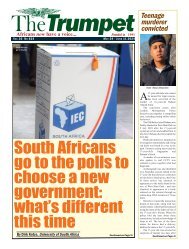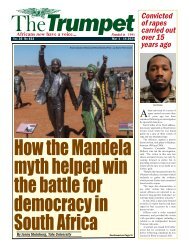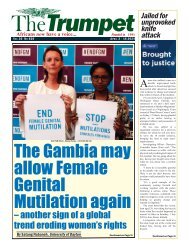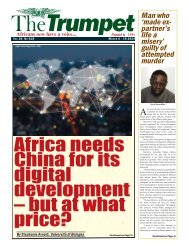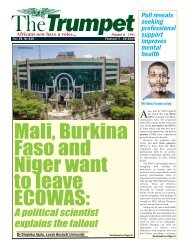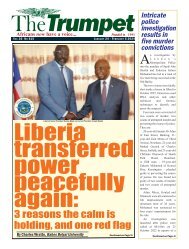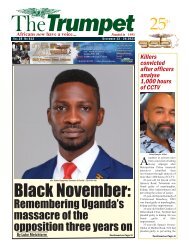The Trumpet Newspaper Issue 625 (June 12 - 25 2024)
Inside Egypt's secret scheme to detain and deport thousands of Sudanese refugees
Inside Egypt's secret scheme to detain and deport thousands of Sudanese refugees
Create successful ePaper yourself
Turn your PDF publications into a flip-book with our unique Google optimized e-Paper software.
Opinion<br />
JUNE <strong>12</strong> - <strong>25</strong> <strong>2024</strong><br />
<strong>The</strong><strong>Trumpet</strong><br />
Page9<br />
Tinubu and the old/new<br />
National Anthem<br />
Continued from Page 8<<br />
for the South East for purposes of equity<br />
and balance; review of the form of<br />
government; local government autonomy,<br />
removal of the immunity clause, State<br />
police, abolition of sponsorship of<br />
religious pilgrimages. Out of all these<br />
weightier issues, it is curious that the one<br />
that catches President Tinubu’s fancy is<br />
the recommendation about the National<br />
Anthem! And the law was passed within a<br />
week – quite a record in legislative<br />
efficiency that deserves deeper probe.<br />
<strong>The</strong> whole saga got really messy when<br />
it became apparent, and the social media<br />
amplified this that indeed in 2022, ahead<br />
of the 2023 general election, President<br />
Tinubu, then a candidate and aspirant<br />
had granted an interview where he<br />
expressed preference for the old National<br />
Anthem and vowed in these words: “the<br />
old anthem is about service, diversity and<br />
commitment. I don’t know why we<br />
changed it. If I had my way, I will bring<br />
it back.” Tinubu won the 2023<br />
Presidential election and now he is having<br />
his way and he has changed Nigeria’s<br />
National Anthem to satisfy his own wish.<br />
Laws are to be made for the common<br />
good, not for persons and their whims.<br />
One of my favourite passages in Lee<br />
Kuan Yew’s book, “From Third World to<br />
First” is where he writes about African<br />
leaders and lawmaking, and how African<br />
leaders create laws to serve personal<br />
interests rather than the interest of the<br />
people. In his view, this hinders<br />
development and perpetuates poverty. In<br />
Some Nigerians are left wondering why a National Anthem should be a subject of urgent national importance<br />
that book, Lee Kuan Yew wrote<br />
specifically about his visit to Nigeria for a<br />
Commonwealth meeting hosted by Prime<br />
Minister Sir Tafawa Balewa. <strong>The</strong>re was<br />
a banquet at the Federal Palace Hotel,<br />
Victoria Island, where Minister Yew sat<br />
opposite Nigeria’s Minister of Finance,<br />
Chief Festus Okotie-Eboh. Of the Chief,<br />
Yew reports in his book that: “He was<br />
going to retire soon. He had done enough<br />
for his country and now had to look after<br />
his business, a shoe factory. As Finance<br />
Minister, he had imposed a tax on<br />
imported shoes so that Nigeria could<br />
make shoes. Singapore Foreign Minister<br />
Sinnathamby Rajaratnam and I were<br />
incredulous. Chief Festus had a good<br />
appetite that showed in his rotund figure,<br />
elegantly camouflaged in colourful<br />
Nigerian robes with gold ornamentation<br />
and a splendid cap. I went to bed that<br />
night convinced that they were a different<br />
people playing to a different set of rules.”<br />
Minister Yew is certainly right.<br />
Nigerians are a different people playing<br />
to a different set of rules. As it was in the<br />
60s, so it is now in <strong>2024</strong>. <strong>The</strong> world is<br />
talking about the future of things driven<br />
by Generative AI, we are here in <strong>2024</strong><br />
talking about National Anthem, we are<br />
busy going back to the past, not knowing<br />
what to do with the present or the future.<br />
To worsen matters, President Tinubu also<br />
wears a splendid cap! And he has made a<br />
law, with the support of the National<br />
Assembly to please himself. It must be<br />
noted that even the Attorney General of<br />
the Federation and Minister of Justice<br />
had to intervene to say that the National<br />
Anthem Act should have been subjected<br />
to wider consultation. Thus, the country’s<br />
chief law officer tactically disowned the<br />
new National Anthem. Law is made for<br />
the people, not the other way round, and<br />
the true test of any law lies in its<br />
acceptance by the people. Dr. Kayode<br />
Ajulo, SAN, OON and AG of Ondo<br />
State has put in an opinion that “the<br />
Nigerian National Anthem Act stipulates<br />
that failure to stand during the rendition<br />
of the anthem is an offense punishable by<br />
imprisonment, fine and or both fine and<br />
imprisonment.” In other words, if more<br />
Nigerians follow the Mrs. Yesufu and<br />
Mrs. Ezekwesili line of protest, Tinubu<br />
would have more than enough people to<br />
arrest. Alternatively, he may face a<br />
situation where most Nigerians regard the<br />
return to the old anthem as a joke.<br />
Already, Nigerians ever so ready to create<br />
a social media skit out of everything have<br />
invented many versions of the National<br />
Anthem; fuji, hip hop, juju and reggae<br />
versions! So, how many people will<br />
Tinubu arrest?<br />
Section 24 (a) of the 1999<br />
Constitution on essential duties of<br />
citizens says that citizens are required to<br />
“abide by this Constitution, respect its<br />
ideals and its institutions, the National<br />
Flag, the National Anthem, the National<br />
Pledge and legitimate authorities.” This<br />
is in Chapter Two, the justiciability of<br />
which remains a subject of debate. I have<br />
not seen a copy of the National Anthem<br />
Act of <strong>2024</strong> - if at all it exists, it is yet to<br />
be published, but it would be most<br />
strange indeed to send anybody to prison<br />
or asked to pay a fine for refusing to sing<br />
the National Anthem. Mrs Aisha Yesifu<br />
may well be right when she proclaimed<br />
that “we are citizens, not slaves.” All<br />
things considered, the re-introduction of<br />
“Nigeria We Hail <strong>The</strong>e” is a gamble.<br />
Nigerians who argue that it is wrong to<br />
return to an anthem written by Lillian<br />
Jean Williams and set to musical score by<br />
Frances Berda are beginning to ask why<br />
the Tinubu government has a colonial<br />
mentality. In 1978, the then Nigerian<br />
military government, opted for a new<br />
National Anthem: “Arise O<br />
Compatriots,” which was selected from<br />
the lyrics of five winning entries, fused<br />
into one. <strong>The</strong> entries were submitted by P.<br />
O. Aderogba, Babatunde Ogunnaike,<br />
John Ikechukwu, Eme Etim Akpan and<br />
Sotu Omoigui. <strong>The</strong> Director of Music,<br />
Nigeria Police Band, Benedict Odiase<br />
selected the lyrics, fused them and<br />
composed the music.<br />
It is most unfortunate that we are busy<br />
discussing National Anthem rather than<br />
more important issues. This is the very<br />
height of cluelessness. We may soon end<br />
up as a nation with two National<br />
Anthems. Those who claim that Tinubu’s<br />
National Anthem is a profound act, and<br />
an achievement of great national<br />
importance should cease and desist<br />
forthwith from sounding so ridiculous.




